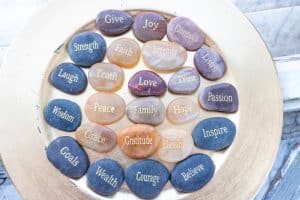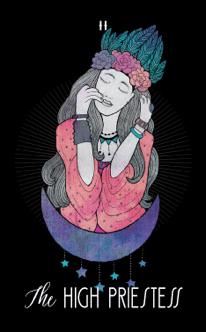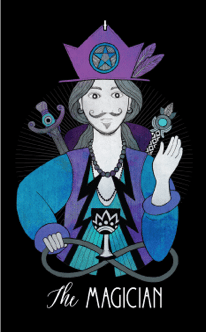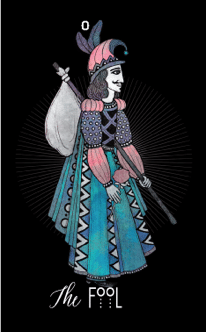Is fate a chain of ungovernable events that are simply random, and have no particular rhyme or reason? Or is our universe not random at all? Perhaps even the smallest happening–a twig broken, a set of keys mislaid, finding a hole in the sweater you meant to wear, and changing your outfit at the last minute–is the result of the influence of some higher power.
Those who ascribe to the first belief may not give credence to the larger forces that shape our human destiny. But those who hold the second view are often aficionados of something known as “cleromancy,” an omnibus category for several classic methods of psychic prediction that employ casting lots and interpreting the resulting messages revealed. For example, when a deck of tarot cards is shuffled, the order in which the cards appear in a reading cannot be predetermined, but is influenced by the emotions and energies of both the querent and the person who is interpreting the cards. Likewise, when consulting Norse runes, the stones are cast, and the reading falls into place via the pull of gravity and psychic emanations of the humans involved.
Find your clarity with a psychic reading. Click here to get started.
A Brief History of I Ching
The I Ching, or Chinese “Book of Changes” is one of the most ancient methods of cleromancy, and dates back, according to some scholars, as far as the 10th Century, B.C., although its current form is most often associated with the reign of King Xuan of Zhou, which lasted from 827 to 782 B.C. Originally intended for use as a manual of divination, the I Ching was based on an even earlier text, “The Changes of Zhou,” or Zhou yi, for which the literal translation is “changes.”
The I Ching is comprised of a series of hexagrams, each containing six lines, broken and unbroken, which represent different combinations of yin and yang, and appear in 64 unique configurations. The meanings of these hexagrams encompass more than mere divination, and are comprised of the aggregated wisdom of Chinese art, music, martial arts, medicine, math, astronomy, philosophy, and even military strategy.
The definition for the hexagrams are credited to three sages: renowned scholar and philosopher Confucius; the legendary mythological emperor and hero of ancient Chinese culture, Fu Xi (who was said to have been born with a man’s head and a serpent’s body) and King Wen of Zhou, founder of the Zhou Dynasty, who, according to legend, came up with the I Ching configuration still used to this day while a prisoner of a rival potentate, King Shāng Zhòu Wáng.
How to Read the I Ching
To gain insight into a present issue and its potential future outcome, one must concentrate on the question at hand while casting coins, which are then interpreted via the corresponding characters of the I Ching.
In ancient times, to divine the I Ching, readers cast a collection of 50 yarrow stalks, and interpreted the meanings from the way they fell. Today, most practitioners of I Ching simply use three like coins to generate hexagrams. Since the hexagram has six lines, the coins are cast six times. The first toss represents the bottom line of the hexagram, and each successive coin toss builds upward toward the top. The different combinations of heads and tails represent broken or solid lines:
Three Heads is a solid line bisecting a circle, represented numerically by the number 9
Two Heads, One Tail is a broken line, represented numerically by the number 8
One Head, Two Tails is a solid line, represented numerically by the number 7
Three Tails is a solid line bisected by an “X”, represented numerically by the number 6
After casting the coins six times, the hexagram is complete, and represents the querent’s current state of affairs. In order to create a hexagram that divines the future, each line in the current hexagram must be transformed into its opposite meaning (a solid line becomes a broken line; a broken line becomes a solid line; a line with a circle becomes a line with an X, and a line with an X becomes a line with a circle).
With your present and future hexagrams in hand, you may now simply consult the I Ching to learn what influences will impact the final outcome of your query. As with the tarot, the I Ching is mutable, offering a projected outcome based on the path you are currently taking. Because human beings have free will, we have the opportunity to alter certain aspects of our fate by recognizing unhealthy influences and changing the things we can change to improve our own actions, as well as the energy surrounding us.
Whether you prefer the wisdom of the I Ching, Runes, or Tarot, there’s no reason to be in the dark when a KEEN advisor can shed light on your most intimate questions.











